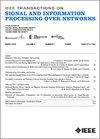Variance-Constrained Distributed Filtering Under Limited Bit Rates for Time-Varying Systems
IF 3
3区 计算机科学
Q2 ENGINEERING, ELECTRICAL & ELECTRONIC
IEEE Transactions on Signal and Information Processing over Networks
Pub Date : 2025-08-22
DOI:10.1109/TSIPN.2025.3600831
引用次数: 0
Abstract
This article concentrates on the variance-constrained distributed filtering problem with the constraint of limited bit rates and imperfect measurements for nonlinear time-varying systems. The measurement outputs undergo the phenomena of sensor saturations and nonlinearities occurring in a random way. An encoding-decoding mechanism (EDM) is implemented to regulate the transmission procedures over shared communication network. The main purpose of this article is to formulate a suitable distributed filtering algorithm to enable the fulfillment of both stochastic时变系统有限比特率下方差约束分布式滤波
本文主要研究非线性时变系统中具有有限比特率约束和不完全测量约束的方差约束分布式滤波问题。测量输出经历传感器饱和和非线性随机发生的现象。实现了一种编解码机制(EDM)来规范共享通信网络中的传输过程。本文的主要目的是制定一种合适的分布式滤波算法,使所得滤波误差系统在有限范围内既能满足随机$H_{\infty }$性能又能满足方差约束。首先建立了满足规定性能约束的充分条件,然后利用一系列迭代矩阵不等式的解推导出合适的滤波器参数。在对滤波误差进行方差约束分析的基础上,利用遗传算法最小化触发译码错误值,优化各节点间的比特率分配。最后,通过一个算例验证了所提分布式滤波方案的有效性。
本文章由计算机程序翻译,如有差异,请以英文原文为准。
求助全文
约1分钟内获得全文
求助全文
来源期刊

IEEE Transactions on Signal and Information Processing over Networks
Computer Science-Computer Networks and Communications
CiteScore
5.80
自引率
12.50%
发文量
56
期刊介绍:
The IEEE Transactions on Signal and Information Processing over Networks publishes high-quality papers that extend the classical notions of processing of signals defined over vector spaces (e.g. time and space) to processing of signals and information (data) defined over networks, potentially dynamically varying. In signal processing over networks, the topology of the network may define structural relationships in the data, or may constrain processing of the data. Topics include distributed algorithms for filtering, detection, estimation, adaptation and learning, model selection, data fusion, and diffusion or evolution of information over such networks, and applications of distributed signal processing.
 求助内容:
求助内容: 应助结果提醒方式:
应助结果提醒方式:


